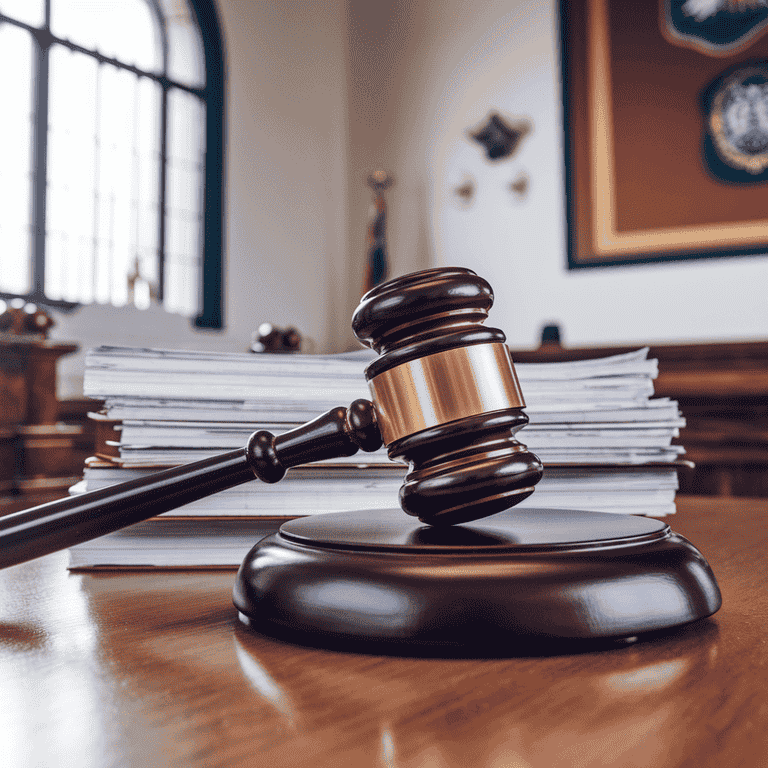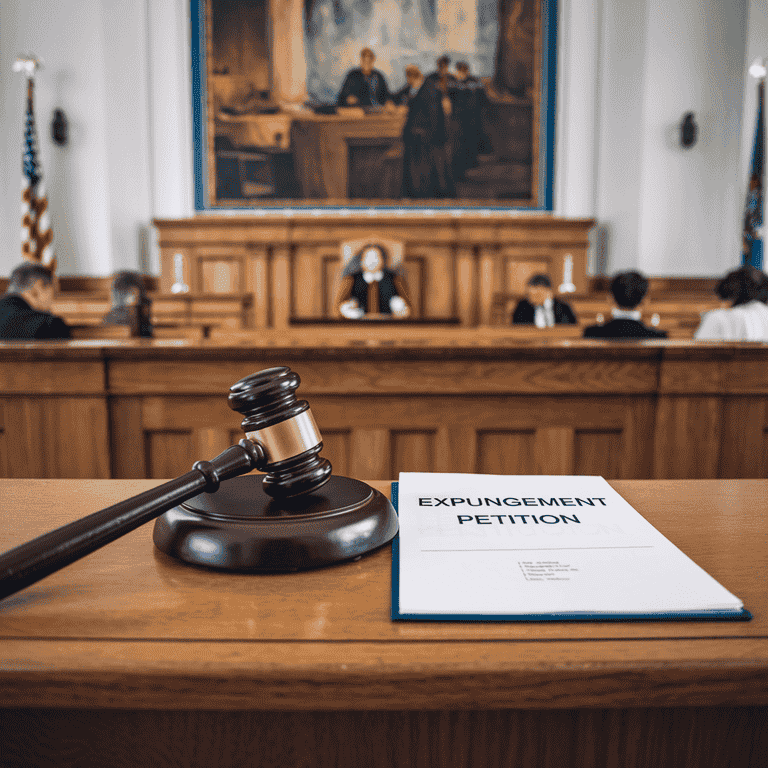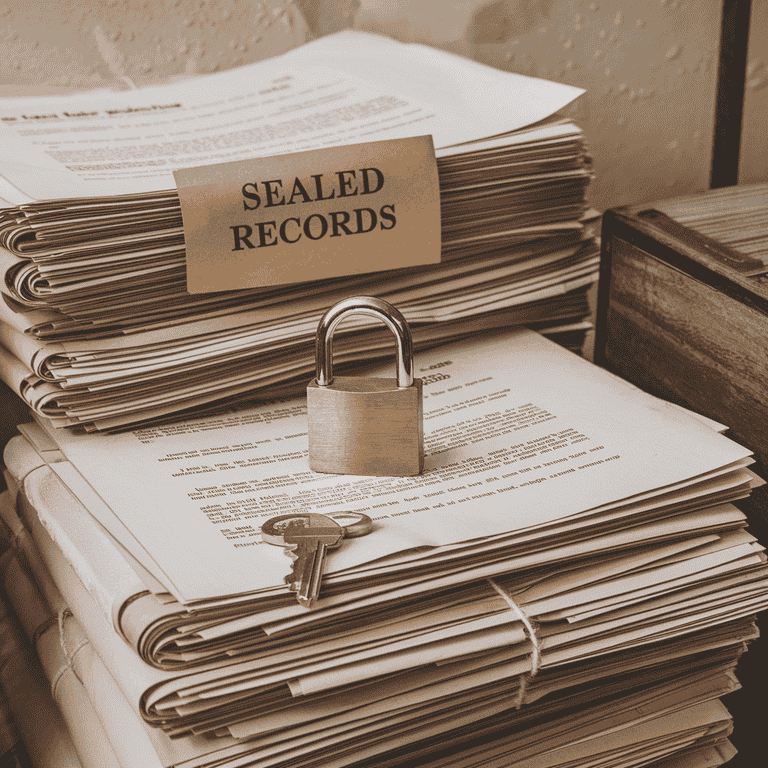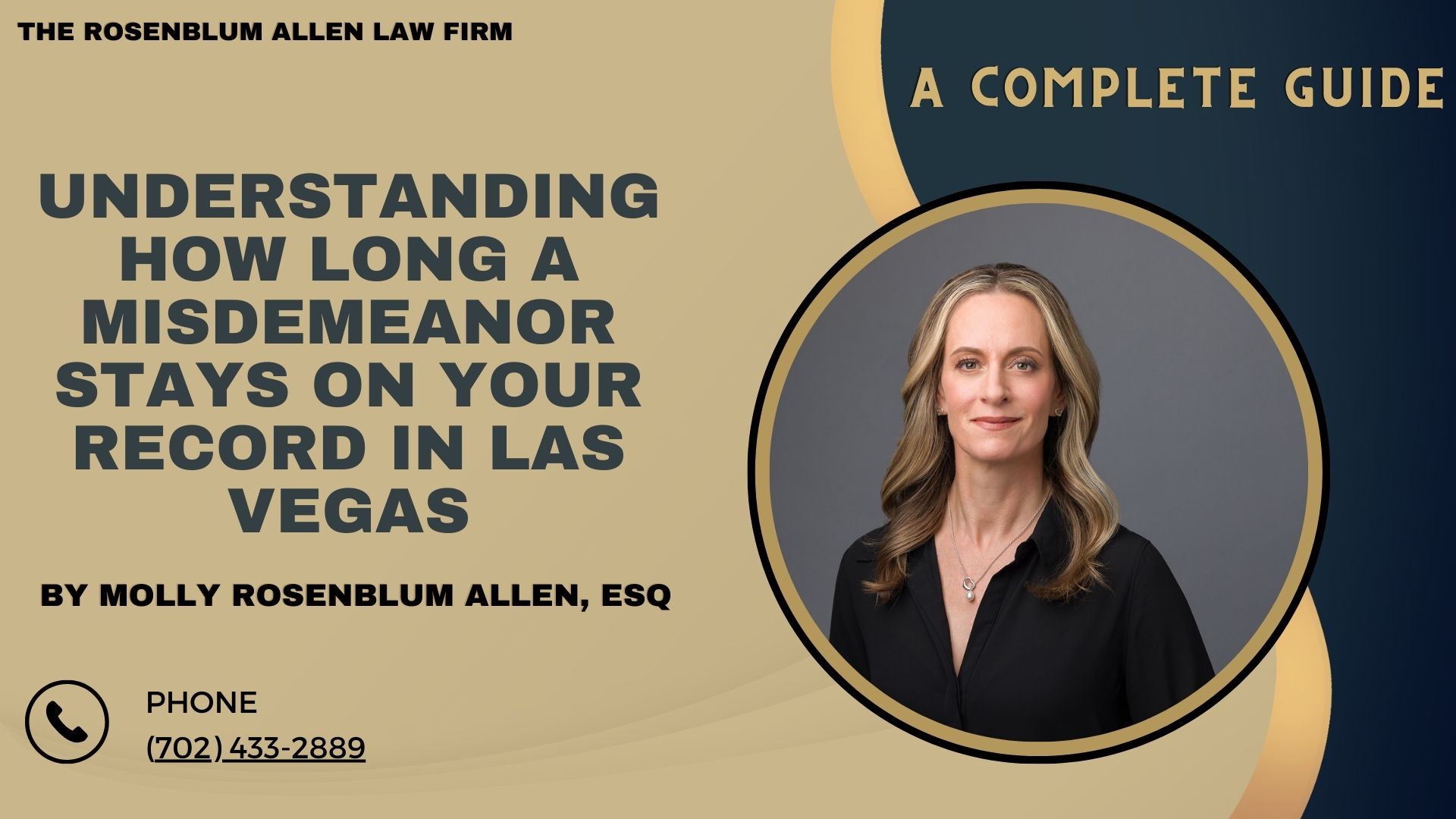A misdemeanor may not seem like a primary offense, but surprisingly, it can still affect your life. Whether you’reapplying for a job, renting a house, or even just trying to move forward, having a misdemeanor on your record can be a hurdle. Many people wonder, “How long does a misdemeanor stay on your record?”
In this guide, we’ll break down everything you need to know, from how long it typically lasts to how you might be able to remove it. Understanding your record is the first step to knowing your options.
Note: Make sure to also check out our Understanding Class C Misdemeanor in Las Vegas post while you’re here.
 What is a Misdemeanor?
What is a Misdemeanor?
Before diving into how long a misdemeanor stays on your record, it’s essential to understand what a misdemeanor is. A misdemeanor is a criminal offense, but it’s considered less severe than a felony. However, it’s still more serious than an infraction, like a parking ticket.
Definition of Misdemeanor vs. Felony
Here’s a quick breakdown of the difference between a misdemeanor and a felony:
- Misdemeanor: Typically punishable by fines, community service, probation, or jail time of less than a year. These offenses are often non-violent or minor crimes.
- Felony: A more serious offense, usually involving more severe punishment, including more than a year of prison time and more significant fines.
Common Examples of Misdemeanors
Misdemeanors can vary depending on the state, but here are some common examples:
- Petty theft
- Public intoxication
- Vandalism
- Disorderly conduct
- Simple assault
- Shoplifting
- Trespassing
These crimes are less severe than felonies but can still result in criminal records and penalties.
Severity and Classification of Misdemeanors
Most states divide misdemeanors into categories or classes based on the severity of the crime:
- Class A (or Class 1): The most serious misdemeanors, such as DUI or domestic violence. These can result in up to a year in jail.
- Class B (or Class 2): Less serious offenses, like minor theft or vandalism, usually lead to shorter jail terms or fines.
- Class C (or Class 3): The least severe, often involving minor infractions like public intoxication or trespassing, with penalties like fines or community service.
The class of misdemeanor can play a role in how long it impacts your life.
How Long Does a Misdemeanor Stay on Your Record?
The question of how long a misdemeanor stays on your record is important, especially if you’re trying to move forward from past mistakes. Unfortunately, the answer isn’t always simple.
Explanation of Permanent Record Concept
In most cases, once convicted of a misdemeanor, it stays on your criminal record permanently. Unlike infractions, which can be forgotten after fines are paid, misdemeanors remain unless they are expunged or sealed.
That said, a misdemeanor doesn’t always actively affect your life forever, but it’s there if someone looks for it.
Differences in State Laws
Each state has rules regarding how long a misdemeanor stays on your record. In some states, getting a misdemeanor expunged or sealed might be more accessible, while in others, the process is more complex.
General Time Frames for How Long Misdemeanors Stay on Records
While misdemeanors stay on your record indefinitely, the timeframe in which they affect things like background checks or legal matters varies:
- Employment background checks: Misdemeanors typically show up for seven years in most standard background checks, although some states have limits.
- Housing applications: Landlords may check for misdemeanors in the last 5-7 years.
- Professional licenses: Depending on the profession, misdemeanors might be reviewed for up to 10 years when obtaining or renewing licenses.
It’s essential to check the specific rules in your state, especially if you’re concerned about how long a misdemeanor may affect opportunities like jobs, housing, or education.

Factors Affecting How Long a Misdemeanor Stays on Your Record
Several factors play a role in determining how long a misdemeanor will impact your life, including its type, location, and whether you’ve had any previous offenses.
Type of Misdemeanor Committed
The type of misdemeanor you’ve committed can influence how long it remains relevant. Serious misdemeanors like DUI or domestic violence charges often stay on your record longer and are more likely to affect background checks than minor infractions like public intoxication or trespassing.
State-Specific Regulations
Every state has different rules about how long a misdemeanor affects your record. Some states have time limits or allow automatic record sealing after a certain period, while others require you to petition the court.
- Example: In some states, non-violent misdemeanors may be sealed after five years, while in others, the record stays open indefinitely unless you pursue expungement.
The Age of the Individual at the Time of the Offense
If you committed the misdemeanor as a juvenile, it may not have the same long-term impact. Many states allow juvenile misdemeanors to be sealed or expunged when you turn 18 or 21, meaning they won’t appear in most background checks after that point.
First-Time vs. Repeat Offenses
First-time offenders are often treated more leniently. Many courts offer programs, like diversion or probation, which allow the misdemeanor to be expunged or sealed after successfully completing the program. Repeat offenders, however, may find it more difficult to have a misdemeanor removed, and the record may have a more lasting impact.
State-Specific Laws on Misdemeanor Record Duration
It heavily depends on where you live, which makes answering “How long does a misdemeanor stay on your record” tricky. State laws vary regarding how long misdemeanors remain on your record and whether they can be sealed or expunged.
Overview of Differing State Laws
In some states, misdemeanors stay on your record indefinitely unless you actively work to remove them. Other states may offer automatic sealing or expungement for certain misdemeanors after a specific period. This difference in state laws can significantly impact your ability to move forward.
States with Longer Record Retention Periods
Some states, like Texas, have stricter rules around how long misdemeanors stay on your record. In these states, misdemeanors remain visible unless you take action to have them expunged or sealed. This means that for the majority of cases, the misdemeanor will be there indefinitely unless you petition the court to remove it.
States with Shorter or More Lenient Retention Periods
Other states, like New York, offer more lenient rules, such as automatically sealing non-violent misdemeanors after ten years. This means that, after a certain period, the record won’t appear in most background checks unless it’s for specific purposes like applying for certain jobs or government clearance.

How to Check if a Misdemeanor is Still on Your Record
If you need clarification on whether a misdemeanor is still on your record. There are a few simple ways to do this. Here’s how to determine if that old misdemeanor still affects your life.
Steps to Request a Criminal Background Check
The most straightforward way to check your record is to request a criminal background check. Here’s how:
- Visit your local police station or sheriff’s office. Most offer fingerprinting and background check services.
- Fill out a request form. You may need to provide personal information, such as your Social Security number or driver’s license.
- Pay a fee. Many places charge a small fee for background checks.
- Wait for the results. The processing time can vary, but you’ll usually get a copy of your record within a few days to a few weeks.
This will give you a detailed look at your record, including any misdemeanors that haven’t been expunged or sealed.
Checking Online Databases
In some states, you can also check your criminal record online. Several states have online databases where you can search public records. Keep in mind that not all misdemeanors may be available for viewing online, and some databases charge a fee.
Hiring a Legal Professional to Verify the Record Status
If you’re uncomfortable doing it yourself or want an professional’s opinion, you can always hire a lawyer or legal professional. They can help you understand what’s on your record and advise you on the next steps if you want to expunge or seal it.
Expungement and Sealing of Misdemeanor Records
Now that you know how to check if a misdemeanor is still on your record, you might be wondering if you can remove it. This is where expungement and sealing come in. These legal processes can ensure your record doesn’t follow you forever.
What is Expungement?
Expungement is a legal process that allows you to “erase” a criminal record. Once a misdemeanor is expunged, it’s as if it never happened. For most purposes, like applying for jobs or housing, it won’t show up in background checks.
What is Record Sealing?
Sealing a record is different from expungement. When a misdemeanor is sealed, it’s still on your record but becomes hidden from most public view. Government agencies and certain employers (like healthcare or education) may still see sealed records, but landlords, private employers, and the general public cannot.
Eligibility for Expungement or Sealing
Only some people can expunge or seal their misdemeanor record. Specific conditions must be met, and they vary by state. Let’s look at what makes you eligible.
Qualifying Factors for Expungement or Sealing
You may be eligible for expungement or sealing if:
- You’ve completed all terms of your sentence. This includes any probation, community service, and fines.
- It’s been a certain amount of time since the offense. Most states require a waiting period of 1-5 years before you can request expungement.
- It’s a first-time offense. Many states give more leniency to first-time offenders, but repeat offenders often face stricter requirements.
- The offense is non-violent. Certain misdemeanors, especially violent ones like assault, may not qualify for expungement.
Waiting Periods Before Eligibility
Most states require you to wait a certain amount before applying for expungement or sealing. For example:
- California: Typically, you can apply for expungement after completing probation.
- Texas: You may need to wait 2-5 years before becoming eligible to petition for expungement.
- New York: Non-violent misdemeanors are automatically sealed after ten years, but you can petition earlier.
Check your state’s rules to find out the waiting periods that apply to your situation.
Process of Determining Eligibility
To determine if you qualify for expungement or sealing, you can:
- Check your state’s expungement laws. Each state has its own criteria for who qualifies.
- Consult with a lawyer. A legal professional can review your case and advise if you meet the requirements.
- Contact the court where you were convicted. They can often provide guidance on your eligibility and next steps.

How to Get a Misdemeanor Expunged
If you’re eligible for expungement, taking steps to clear your record can have significant benefits. While the process may feel intimidating, it’s often straightforward once you know what to expect. Here’s a breakdown of how to get a misdemeanor expunged.
Step-by-Step Guide to the Expungement Process
- Research your eligibility.
- Start by confirming that you qualify for expungement in your state. Check factors like waiting periods, type of offense, and whether you’ve completed your sentence.
- Gather necessary documentation.
- You’ll need necessary documents, such as:
- Court records of your misdemeanor
- Proof of sentence completion (probation, fines, community service)
- A copy of your criminal record (which you can get through a background check)
- File a petition in court.
- Once you’ve confirmed eligibility and gathered your documents, you’ll need to file a petition for expungement in the court where you were convicted. Many states have official forms you can fill out.
- Pay the required fee.
- Expungement isn’t free. Depending on your state, there’s usually a filing fee, ranging from $50 to several hundred dollars.
- Attend a court hearing.
- In some cases, the court may schedule a hearing to review your request. This is your opportunity to present your case and explain why your record should be deleted.
- Receive the court’s decision.
- If approved, the misdemeanor will be removed from your public record. While this doesn’t happen overnight, once processed, the conviction should no longer appear in most background checks.
Filing a Petition in Court
The petition process can feel like a lot of paperwork, but it’s essential to get it right. If you’re unsure how to proceed, it’s worth consulting an attorney to help you navigate the process.
Gathering Necessary Documentation
Here’s a simple checklist of documents you may need to gather:
- Proof of Sentence Completion: This could include probation records, receipts for fines paid, or completion certificates for community service.
- Court Records: These are available from the courthouse where your case was handled.
- Criminal Background Check: You can request this through local authorities or use online services in some states.
How to Get a Misdemeanor Sealed
If expungement isn’t an option, sealing your record is the next best thing. While sealing doesn’t completely erase the misdemeanor, it hides it from most public view, making it invisible to employers, landlords, and private entities.
Step-by-Step Guide to Sealing a Record
- Verify your eligibility.
- As with expungement, the first step is to make sure you qualify. Each state has different rules about which offenses can be sealed.
- Complete the necessary paperwork.
- To request sealing, you’ll need to fill out an application. The forms are often available on your state’s official court website.
- File your request in court.
- Submit the paperwork to the court where your case was handled. Follow all the instructions carefully and provide any supporting documentation.
- Pay a filing fee.
- Just like with expungement, there’s usually a fee to file for sealing your record, which varies depending on the state.
- Attend a court hearing (if required).
- Some states may require a hearing where a judge reviews your petition. This can be your chance to explain why sealing your record will help you move forward.
- Wait for the court’s decision.
- Once approved, your record will be sealed. While the misdemeanor still technically exists, it won’t appear in background checks for most jobs or housing applications.
Court Petition Process
The process of sealing a record involves filing specific forms with the court. These forms usually require details about your case, like the type of misdemeanor and when it occurred. Some states also allow you to submit evidence showing you’ve been a law-abiding citizen since the conviction, which can strengthen your case.

Effects of Expungement and Sealing on Your Record
Once your record is expunged or sealed, you’ll likely experience some major benefits. Both processes aim to make it easier for you to move forward without the stigma of a criminal record. However, each has different impacts on your record and background checks.
What Happens After a Misdemeanor is Expunged?
When a misdemeanor is expunged, it’s essentially wiped away as if it never happened. You can legally answer “no” if an employer asks whether you’ve been convicted. The conviction should no longer appear in most criminal background checks.
However, it’s important to know that certain entities—like law enforcement or immigration authorities—might still access the expunged record. But the record is gone for most day-to-day purposes, like applying for jobs or housing.
Does Sealing Remove the Record from Public View?
Yes. When a record is sealed, it’s hidden from the public eye. Employers, landlords, and other private parties won’t be able to see the conviction. However, some government agencies or courts may still be able to access it if necessary.
Sealing can be especially helpful if you’re trying to get your life back on track but aren’t eligible for expungement.
Can a Misdemeanor Still Show Up After Expungement or Sealing?
Even after your record is expunged or sealed, there may still be cases where the misdemeanor shows up. While rare, it’s something you should be aware of.
Instances Where Expunged or Sealed Records May Still Appear
There are specific scenarios where your expunged or sealed misdemeanor might still show up:
- Government employment or security clearance. If you’re applying for a government job or any position that requires a high level of security clearance, your expunged or sealed record may still be accessible.
- Federal background checks. While state background checks typically won’t show sealed or expunged misdemeanors, certain federal agencies (like the FBI) can still access this information.
Federal vs. State Background Checks
State-level expungement or sealing may not remove the record from federal databases. For example, a federal background check for a government job could still reveal the record if you were convicted of a misdemeanor and the state seals it.
Special Circumstances (e.g., Government Employment, Professional Licensing)
Some employers—especially those in sensitive fields like education, law enforcement, or healthcare—may still be able to see sealed records. This is particularly true for professional licensing boards that conduct thorough checks before granting a license.
Misdemeanors and Employment Background Checks
One of the most significant concerns for many people with a misdemeanor on their record is how it affects job opportunities. Many employers perform background checks before hiring, and having a criminal record could be a red flag. The good news is that understanding how long a misdemeanor stays on your record can help you plan your next steps, whether seeking expungement or just preparing to answer tough questions.
How Long Employers Can See Misdemeanors on Your Record
Misdemeanors can show up on employment background checks for years. How long they appear depends on the state and the employer’s policies. Misdemeanors are usually visible in standard background checks for up to 7 years. However, some states allow misdemeanors to remain on record indefinitely unless expunged.
Some states, like California, have rules limiting what can be seen after a specific time:
- California: Employers cannot consider misdemeanors older than seven years.
- Texas: Misdemeanors remain visible until expunged, regardless of time.
- New York: Non-violent misdemeanors may be sealed after 10 years, removing them from most checks.
Rules for Private Employers vs. Government Agencies
There’s a difference between what private employers and government agencies can see. While private employers may be limited in what they can access after a certain number of years, government agencies and jobs requiring security clearance often have access to more detailed records, even if they’re sealed or expunged.
Private Employers:
- Typically, they see misdemeanors on background checks for 5-7 years.
- Some states restrict access to misdemeanors after a set time.
Government Agencies:
- May have access to full criminal records, including expunged or sealed misdemeanors.
- Jobs with security clearance or law enforcement often require more thorough checks.
How to Disclose or Explain a Misdemeanor During Job Applications
If a background check reveals your misdemeanor, it’s essential to be honest and prepared to explain the situation. Here are a few tips:
- Be upfront. If the application asks about criminal history, don’t hide it. If the employer finds out later, it can look worse.
- Explain the circumstances. Mention that the offense was long ago or that you’ve grown since the incident. Highlight what you’ve learned or the positive steps you’ve taken since then.
- Focus on your strengths. While you should acknowledge the misdemeanor, could you not dwell on it? Shift the conversation back to your qualifications and why you’re the best fit for the job.

How Long Does a Misdemeanor Affect Housing Applications?
Just like with employment, misdemeanors can affect your ability to rent a home. Many landlords perform background checks, and a misdemeanor can raise concerns about your trustworthiness as a tenant. The good news? It doesn’t last forever.
Landlord Background Check Policies
Landlords use background checks to screen tenants, often looking for criminal history, credit scores, and past rental behavior. While policies differ, most landlords focus on criminal offenses from the past 5-7 years. After that, they’re less likely to consider old misdemeanors.
How Misdemeanors Impact Rental Applications
A misdemeanor may cause a landlord to deny your rental application. Some landlords are stricter, while others may be willing to overlook minor offenses, especially if they occurred several years ago or aren’t directly relevant to renting (e.g., a public intoxication charge vs. a charge for property damage).
Here’s how different types of misdemeanors can impact rental applications:
- Non-violent misdemeanors: More likely to be overlooked, especially if they’re old.
- Violent misdemeanors or drug-related offenses: This may raise more concerns for landlords and lead to the denial of your application.
What Landlords Typically Look for in a Criminal Record
Landlords are primarily concerned with the safety and security of their property and other tenants. They may deny applications for:
- Violent crimes (assault, battery)
- Property crimes (theft, vandalism)
- Drug-related offenses (possession, intent to sell)
Minor misdemeanors, like trespassing or public intoxication, might not raise red flags, especially if they occurred years ago and don’t suggest a risk to the landlord’s property or community.
How Long Does a Misdemeanor Affect Professional Licensing?
Getting a professional license is another area where having a misdemeanor on your record can pose a challenge. Licensing boards, particularly in fields like healthcare, education, and law, often perform extensive background checks.
Professions That Require Background Checks
Here are a few examples of professions that typically require background checks and may be affected by a misdemeanor:
- Healthcare workers (doctors, nurses, etc.)
- Teachers and educators
- Lawyers
- Real estate agents
- Law enforcement officers
The licensing board will likely review your criminal record if you’re pursuing a career in one of these fields.
Impact of Misdemeanors on Professional License Eligibility
Some misdemeanors may make it difficult to obtain or renew a professional license. Licensing boards typically look for convictions that suggest poor judgment or a risk to public safety.
Misdemeanors related to dishonesty, violence, or substance abuse can be particularly problematic. However, many boards also take into account the time since the offense, your behavior since then, and whether the misdemeanor relates directly to the profession.
For example:
- A DUI misdemeanor might cause issues for a healthcare professional but may not be as impactful for a real estate agent.
- A theft charge could be a red flag for a financial advisor but might be less concerning for a construction worker.
State-Specific Rules for Licensing Boards
Each state’s licensing board has its own rules about misdemeanors. In some states, you can appeal a board’s decision by showing rehabilitation or evidence of good behavior since the offense.

How Long Does a Misdemeanor Affect Financial Aid and Education?
A misdemeanor can also impact your ability to secure financial aid for education. However, the rules regarding criminal records and financial aid are generally more forgiving than with jobs or housing.
Impact of Misdemeanors on Student Loans and Financial Aid
Most misdemeanors don’t disqualify you from receiving federal student loans or financial aid. However, drug-related misdemeanors may affect your eligibility for federal assistance. The Free Application for Federal Student Aid (FAFSA) will ask about drug convictions, and you may face restrictions if your misdemeanor is drug-related.
Fortunately, you can often regain eligibility for aid after completing an approved rehabilitation program or after a certain period has passed.
College and University Admission Policies Regarding Criminal Records
Colleges and universities often conduct background checks during the admissions process. A misdemeanor doesn’t automatically mean you’ll be denied admission, but schools may consider the nature of the offense.
Factors schools may consider:
- It’s time since the offense
- A misdemeanor from several years ago may have little impact.
- Type of misdemeanor
- Violent or drug-related misdemeanors might raise more concerns.
- Your explanation
- Schools may ask for a personal statement explaining the circumstances of the offense and what you’ve done since.
Many colleges are open to admitting students with misdemeanors, especially if you can show growth and responsibility.
Rehabilitation and Second-Chance Education Programs
If your misdemeanor limits your financial aid or college admissions options, there are second-chance programs and scholarships for people with criminal records. These programs are designed to help individuals get back on track through education and career training.
Programs like Second Chance Pell Grants provide opportunities for formerly incarcerated individuals to receive education despite having a criminal record. If you’ve faced barriers due to a misdemeanor, these programs may offer a pathway to higher education.
How Long Does a Misdemeanor Affect Voting Rights?
Your right to vote is one of the most fundamental privileges of citizenship. For many people with a misdemeanor on their record, the question arises: “Can I still vote?” Fortunately, in most cases, misdemeanors don’t interfere with your voting rights. But let’s break down how it works, especially in different states.
Misdemeanor Convictions and Voting Rights in Different States
In most states, misdemeanor convictions do not affect your right to vote. Unlike felony convictions, which can sometimes result in losing voting rights, a misdemeanor conviction typically allows you to continue voting without issues.
However, some states may have exceptions for specific misdemeanors, particularly those involving election fraud or voter-related crimes. For example, in some places, if you’re convicted of a crime related to voting, your voting rights might be temporarily suspended.
Restoration of Voting Rights Post-Conviction
Even in the rare instances where a misdemeanor might impact your voting rights (such as crimes directly related to the voting process), your rights are often automatically restored once you’ve completed your sentence. You don’t usually need to file any paperwork or petition to regain the right to vote.
In some states, you may need to check with local election officials to ensure your voting status is up-to-date, but this is rare for misdemeanor convictions.

Breaking It All Down
Misdemeanors can feel heavy, but they don’t have to define your future. Whether you’re trying to get a job, apply for housing, or figure out how your voting rights are affected, it’s essential to understand how long a misdemeanor stays on your record and how it may impact your life.
While misdemeanors generally remain on your record unless expunged or sealed, many aspects of your life, such as employment and housing, may only be affected for a limited time. Additionally, options like expungement and sealing provide a way to move forward and leave the past behind.
If you’re worried about the long-term consequences of a misdemeanor, there are steps you can take to reduce its impact. Checking your eligibility for expungement, understanding your state’s laws, and staying informed about your rights can all help you manage your record and get a fresh start.

Frequently Asked Questions
Can a misdemeanor affect my ability to travel internationally?
Yes, a misdemeanor can sometimes affect international travel, depending on the country you’re visiting. Some countries, like Canada, have strict policies regarding entry for individuals with criminal records, including misdemeanors. It’s essential to check the entry requirements of your destination country beforehand to avoid any surprises.
Does a misdemeanor automatically disappear after a certain number of years?
No, a misdemeanor does not automatically disappear from your record after a set period. Unless you take steps to delete or seal it, the conviction remains on your criminal record indefinitely. Some states may offer automatic sealing for non-violent misdemeanors after a specific time, but this is not the case everywhere.
Will a misdemeanor appear in a background check if it’s expunged or sealed?
In most cases, if a misdemeanor is expunged or sealed, it won’t appear in a standard background check for private employers or landlords. However, certain government agencies, law enforcement, and employers requiring security clearances may still have access to expunged or sealed records.
Can I be denied insurance because of a misdemeanor?
While uncommon, certain misdemeanors, such as DUI or fraud-related offenses, might raise red flags for insurance companies. Some companies may view individuals with a criminal record as higher risk, potentially leading to higher premiums or, in rare cases, denial of coverage. It’s essential to check with your insurance provider to see how a misdemeanor may impact your rates or eligibility.
Do misdemeanors affect my credit score?
No, a misdemeanor conviction does not directly affect your credit score. However, if the conviction results in financial difficulties, such as unpaid fines or court fees, that could lead to issues like collections or liens, which could indirectly impact your credit.
How do I find out if my state allows expungement of misdemeanors?
You can start by researching your state’s expungement laws online or contacting your local courthouse. Each state has different criteria for expungement, so it’s essential to understand the requirements specific to your location. Consulting with a criminal defense attorney can also provide accurate, personalized information.
Can I still apply for student housing with a misdemeanor on my record?
Yes, you can still apply for student housing, but some universities may have policies requiring background checks. The impact of a misdemeanor on student housing will depend on the nature of the offense and the school’s specific guidelines. Minor, non-violent misdemeanors are less likely to result in denial.
Does a misdemeanor prevent me from owning a firearm?
It depends on the type of misdemeanor. Most misdemeanors won’t affect your right to own a firearm. However, certain misdemeanor convictions—especially those related to domestic violence—can lead to restrictions on gun ownership under federal law.
How long does a misdemeanor stay on my driving record?
A misdemeanor, such as a DUI, can appear on your driving record for several years, often ranging from 3 to 10 years, depending on the state. Your driving record is separate from your criminal record, but both can affect insurance premiums and legal penalties.
Can I get a passport with a misdemeanor?
In most cases, a misdemeanor will not prevent you from obtaining a passport. However, certain misdemeanors could complicate the process, particularly those involving travel restrictions or active legal issues. Always check with legal authorities if you’re unsure.
Will a misdemeanor affect my ability to adopt a child?
It might. Adoption agencies typically conduct thorough background checks, and a misdemeanor conviction, especially one related to violence or child welfare, could impact your eligibility. However, not all misdemeanors will disqualify you, and agencies may consider the nature and age of the offense.
Do I need a lawyer to expunge a misdemeanor?
While it’s possible to file for expungement on your own, having a lawyer can make the process smoother and increase your chances of success. An attorney can ensure you meet all eligibility requirements and help you navigate the necessary paperwork and court appearances.

Glossary
Background Check: A process where an individual’s criminal, financial, or personal records are reviewed, often by employers, landlords, or government agencies, to assess their history and suitability for specific roles or services.
Criminal Record: A documented history of a person’s criminal convictions, including felonies, misdemeanors, and other offenses, maintained by law enforcement and legal authorities.
Expungement is a legal process that removes or erases a conviction from an individual’s criminal record, making it as if the crime never occurred for most purposes, such as employment and housing.
Felony: A serious criminal offense that typically results in severe punishments such as imprisonment for over a year, hefty fines, or both. Felonies are more severe than misdemeanors.
Infraction: A minor violation of the law, usually punishable by fines rather than jail time. Common examples include traffic tickets or parking violations.
Misdemeanor: A criminal offense less severe than a felony but more serious than an infraction, typically punishable by a fine, probation, community service, or jail time of less than a year.
Petition: A formal written request submitted to a court, typically asking for a specific legal action, such as the expungement or sealing a criminal record.
Probation: A court-ordered period during which an offender is subject to certain conditions instead of serving time in jail. Failure to meet probation terms can result in imprisonment.
Public Record: Documents or pieces of information that are not considered confidential and are accessible by the general public, including criminal convictions, property records, and government filings.
Sealing: A legal process where a criminal record is hidden from most public view. The record still exists, but it’s not visible to employers, landlords, or private individuals; however, some government agencies may still access it.
Security Clearance is a status granted to individuals allowing them access to classified information or restricted areas, typically following an extensive background check. A misdemeanor on a record can sometimes impact the ability to obtain this.
Waiting Period: You must wait after completing your sentence (probation, community service, fines) before becoming eligible to petition for expungement or sealing of a criminal record.
Violent Crime: A crime involving the use of force or the threat of force against another person. Misdemeanors categorized as violent crimes can have more severe consequences and are more challenging to expunge or seal.
Non-Violent Crime: A crime that does not involve the use of force or physical harm to another person, such as theft or drug possession. Non-violent misdemeanors are often easier to expunge or seal.
Restoration of Rights: The process by which an individual regains certain legal rights, such as voting or gun ownership, after they have been restricted due to a criminal conviction.
Juvenile Record: A criminal record for offenses committed by individuals under 18. In many states, juvenile records can be sealed or expunged once the individual reaches adulthood.
Automatic Sealing: A process where certain non-violent crimes are automatically sealed after a specified period without requiring the individual to file a petition or request it.
Diversion Program: A rehabilitation program offered to first-time offenders as an alternative to traditional sentencing. Successful completion can often lead to the dismissal or sealing of the criminal record.

Additional Resources for You
As you navigate through the complexities of the legal system, it’s crucial to have reliable resources at your fingertips. Our lead attorney, Molly Rosenblum Allen, Esq., has meticulously crafted a suite of resources to aid you in your time of need. Each guide is designed to provide you with in-depth understanding and actionable advice on various legal topics. Here’s a brief overview of these invaluable resources:
Double Jeopardy: Explore the nuances of double jeopardy and how it protects individuals from being tried twice for the same offense. Read more.
Hung Jury: Gain insight into what happens when a jury cannot agree on a verdict, known as a hung jury, and the implications for a defendant. Discover more.
Circumstantial Evidence: Understand the role and importance of circumstantial evidence in the legal process. Learn more.
Indicted vs Charged: Clarify the difference between being indicted and being charged, and what each means for the accused. Dive deeper.
Difference Between Jail and Prison: Demystify the distinctions between jail and prison, two types of detention facilities with different purposes and durations of stay. Explore the differences.
What are Miranda Rights: Learn about the critical rights known as Miranda Rights, which protect individuals during police interrogations. Understand your rights.
How to Check if You Have an Outstanding Warrant: Find out how to check for any outstanding warrants against you, ensuring you can take necessary legal steps. Check now.
What to Look for in a Criminal Defense Lawyer: Discover key qualities and factors to consider when selecting a criminal defense lawyer to represent you. Learn what to look for.
Possible Ways to Reduce a Felony Charge: Explore strategies and legal avenues to potentially reduce the severity of a felony charge. Read about reduction strategies.
Should You Accept a Plea Bargain: Delve into the considerations and implications of accepting a plea bargain in your case. Make an informed decision.
Each of these resources is tailored to equip you with knowledge and strategies for dealing with specific legal challenges. Whether you’re facing charges or simply seeking to expand your legal knowledge, Molly Rosenblum Allen, Esq., and the team at The Rosenblum Allen Law Firm are here to support you every step of the way.

Outside Resources for You
American Civil Liberties Union (ACLU): A non-profit organization committed to defending and preserving the individual rights and liberties guaranteed to every person in this country by the Constitution and laws of the United States. Visit ACLU.
FindLaw: A comprehensive resource for legal information, offering a broad array of knowledge on various legal topics, including criminal defense and the nuances of misdemeanor charges. Visit FindLaw.
National Association of Criminal Defense Lawyers (NACDL): An organization that aims to ensure justice and due process for persons accused of crime, foster the integrity, independence, and expertise of the criminal defense profession. Visit NACDL.
Avvo: An online legal services marketplace that provides lawyer referrals and access to a database of legal information consisting primarily of previously answered questions. Lawyer profiles may also include client reviews, lawyer endorsements, and disciplinary records. Visit Avvo.
Justia: Offers free case law, codes, regulations, and legal information for lawyers, business, students, and consumers worldwide. Visit Justia.
National Legal Aid & Defender Association (NLADA): Dedicated to ensuring access to justice for all Americans, NLADA provides advocacy, guidance, and resources on legal aid and public defense. Visit NLADA.
United States Courts: The official website of the federal judiciary, offering insights into court processes, educational resources, and information about federal cases. Visit United States Courts.

A Special Message from Our Lead Attorney, Molly Rosenblum Allen, Esq

Dear Reader,
Thank you for taking the time to engage with our resources. I hope you found them helpful. They can guide you through the complex legal landscape. At The Rosenblum Allen Law Firm, we commit to empowering our clients. We also seek to empower the broader community. We give them the knowledge and tools they need to face legal challenges confidently.
Understanding your legal rights and options is the first step. It leads to a positive outcome in any legal matter. You may be dealing with a misdemeanor charge. Or, looking to understand the law. Or, seeking guidance on a legal concern. We’re here to help.
I invite you to schedule a free consultation to discuss your situation in more detail. Our team dedicates itself to providing you with the support and expertise you need. Please call us at (702) 433-2889 to arrange a time that works for you.
Your trust in us is something we deeply value, and we look forward to the opportunity to serve you.
Warmest regards,
Molly Rosenblum Allen, Esq.
The Rosenblum Allen Law Firm




